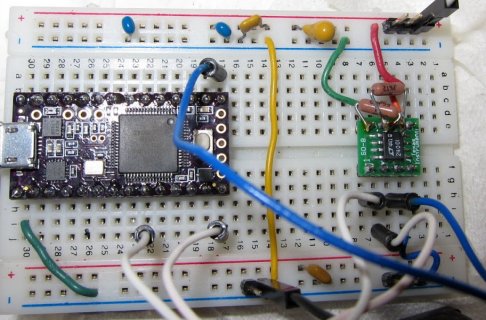In case of interest. The Linear Tech LTC2400 is the easiest to use 24-bit ADC I've found (in a SO-8 package, not much to go wrong).
Using 4x NiMH AA cells to provide a quiet +5V supply, with 2x 1.000k 0.1% resistors as a 2:1 divider to put the input at 0.5 Vref, and running the above code I see the output readings have about 1.7 microvolts RMS noise, that is less than 0.5 ppm of the 5V full scale. Not bad at all, and I didn't even separate Vref from Vcc. Note: if I use the +5V USB for Vref instead of the battery supply, I get about 100 uV rms noise.
I soldered the 2x1k input divider to the board, because you can't get microvolt low noise connections using breadboard contacts.

Code:
/*
Interface Teensy 3 with Linear Tech LTC2400 24-bit ADC (7.5 Hz sample rate)
by J.Beale March 26, 2016
Signal ADC Teensy
---------------------
CS: pin 5 pin 7
MISO: pin 6 pin 12
SCK: pin 7 pin 13
---------------------
*/
#include <SPI.h> // standard SPI library
#define VREF (5.000) // reference voltage
#define SAMPLES (50) // how many samples to group together for stats
const int chipSelectPin = 7;
const int SDO = 12; // SPI Input line (high->low = data ready)
unsigned int cnt; // simple loop counter
void setup() {
Serial.begin(115200);
SPI.begin();
pinMode(chipSelectPin, OUTPUT);
cnt = 0;
delay(2000); // because Windows doesn't notice the serial port that fast
Serial.println("count,sec,value,stdev");
Serial.println("# LTC2400 v0.3 Mar.26 2016 jpb");
}
void loop() { // **** main loop
double datSum = 0; // reset our accumulated sum of input values to zero
double sMax;
double sMin;
long n; // count of how many readings so far
double x,mean,delta,sumsq,m2,variance,stdev; // to calculate standard deviation
sMax = -VREF; // set max to minimum possible reading
sMin = 2*VREF; // set min to max possible reading
sumsq = 0; // initialize running squared sum of differences
n = 0; // have not made any ADC readings yet
mean = 0; // start off with running mean at zero
m2 = 0;
for (int i=0;i<SAMPLES;i++) {
x = readWord() * VREF / (1<<28); // analog reading in units of Volts
datSum += x;
if (x > sMax) sMax = x;
if (x < sMin) sMin = x;
// from http://en.wikipedia.org/wiki/Algorithms_for_calculating_variance
n++;
delta = x - mean;
mean += delta/n;
m2 += (delta * (x - mean));
}
variance = m2/(n-1); // (n-1):Sample Variance (n): Population Variance
stdev = 1E6*sqrt(variance); // Calculate standard deviation in microvolts
float tsec = millis()/1000.0; // elapsed time in seconds
Serial.print(cnt++);
Serial.print(",");
Serial.print(tsec,2); // elapsed time, seconds
Serial.print(",");
Serial.print(mean,7); // average reading, volts
Serial.print(",");
Serial.print(stdev,2); // standard deviation, microvolts
Serial.println();
} // end loop()
// Read data from Linear Tech LTC2400 (24-bit ADC) using SPI
// The data word is actually 28 bits, although lowest 4 bits are noise
unsigned long int readWord() {
byte inByte = 0; // incoming byte from the SPI
byte bytesToRead = 4; // read this many bytes from SPI
unsigned long int result = 0; // result to return
boolean EXR = 0;
boolean SGN = 0;
// LTC2400 SPI clock can go up to 2 MHz
SPI.beginTransaction(SPISettings(2000000, MSBFIRST, SPI_MODE0));
digitalWrite(chipSelectPin, LOW);
while (digitalRead(SDO) == 1) {} // wait for MISO to fall low => conversion ready
result = SPI.transfer(0x00);
SGN = result & 0x20; // Sign bit
EXR = result & 0x10; // Extended Range bit
result &= 0x0f; // mask off high 4 bits
for (byte i=0; i<3; i++) { // read remaining 3 bytes of 32-bit output word
result <<= 8;
result |= SPI.transfer(0x00);
}
digitalWrite(chipSelectPin, HIGH); // put chip in sleep mode
SPI.endTransaction(); // release control of SPI port
return(result); // return 28-bit ADC result
} // readWord()Using 4x NiMH AA cells to provide a quiet +5V supply, with 2x 1.000k 0.1% resistors as a 2:1 divider to put the input at 0.5 Vref, and running the above code I see the output readings have about 1.7 microvolts RMS noise, that is less than 0.5 ppm of the 5V full scale. Not bad at all, and I didn't even separate Vref from Vcc. Note: if I use the +5V USB for Vref instead of the battery supply, I get about 100 uV rms noise.
Code:
count,sec,value,stdev
# LTC2400 v0.3 Mar.26 2016 jpb
0,8.81,2.5004500,1.58
1,15.51,2.5004497,1.65
2,22.21,2.5004504,1.40
3,28.91,2.5004499,1.77
4,35.61,2.5004503,1.71
5,42.31,2.5004501,1.30
6,49.01,2.5004502,1.62
7,55.70,2.5004505,1.59
8,62.40,2.5004501,1.23
9,69.10,2.5004506,1.51
10,75.80,2.5004502,1.35I soldered the 2x1k input divider to the board, because you can't get microvolt low noise connections using breadboard contacts.


